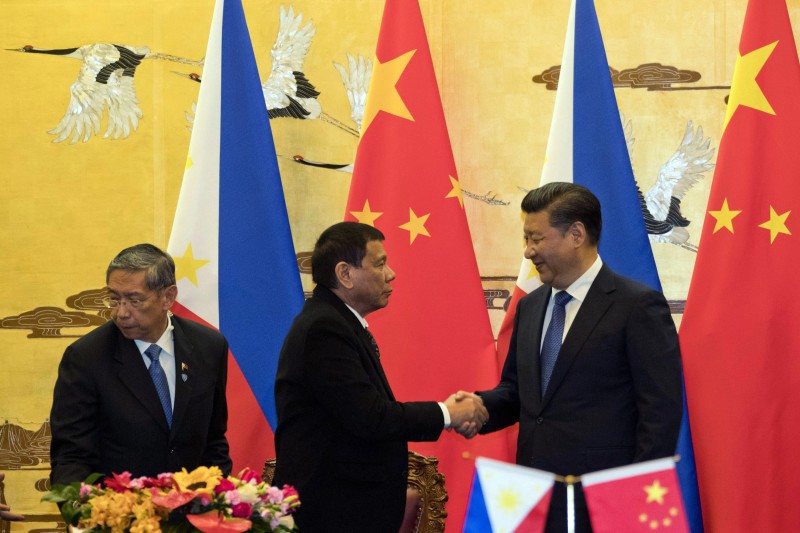Only potential investments

Philippine President Rodrigo Duterte, center, and Chinese President Xi Jinping shake hands after a signing ceremony in Beijing, China, Thursday, Oct. 20, 2016. Duterte was meeting Thursday with Xi in Beijing as part of a charm offensive aimed at seeking trade and support from the Asian giant by setting aside a thorny territorial dispute. (AP Photo/Ng Han Guan, Pool)
The foreign trips of Philippine presidents are often measured in terms of the investments and financial assistance obtained from the countries visited. Naturally, every president wants a figure higher than that notched by his or her predecessor.
President Duterte’s state visits to China and Japan are no different, even if those trips must have been triggered by his growing rift with the Philippines’ longtime ally, the United States. Earlier, he visited Brunei, but that trip was more of a reaffirmation of economic and political relations. The bulk of the investments (or, as we have found out, pledges), credit lines, and aid came from China and Japan.
Article continues after this advertisementFrom China, the administration claimed to have gotten $24 billion in investments and credit line offers. Trade Secretary Ramon Lopez said investment projects worth $15 billion were signed during Mr. Duterte’s visit.
But an Inquirer report soon pointed out that a Chinese construction firm banned by the World Bank and a dredging firm that Beijing reportedly used for reclamation activities in the South China Sea were among the companies identified by the administration as having signed big-ticket infrastructure projects during the President’s visit. The contract of China Road and Bridge Corp. with the Bases Conversion and Development Authority (BCDA) was to develop the Bonifacio Global City-Ninoy Aquino International Airport segment of the Metro Manila Bus Rapid Transit-Edsa project. CCCC Dredging Co. also signed an investment project with Mega Harbour Port for the Cebu International and Bulk Terminal project despite its involvement in reclamation activities in disputed territories.
An official clarification has since been made: No contracts, just memorandums of understanding (MOUs) with Chinese companies for feasibility studies were signed in China, according to BCDA president and CEO Vivencio Dizon. “It is by no means an award of the contract. We are very far from that point in the process; we are only at Step 1—the feasibility study,” he said.
Article continues after this advertisementIn Japan, the official statement was clearer: The Philippines received “offers of investments” and loans totaling $19 billion during Mr. Duterte’s visit. The bulk, or $17.2 billion, was from Marubeni Corp., one of Japan’s major integrated trading and investment conglomerates or “sogo shosha.” According to a document provided by Trade Secretary Lopez, Marubeni will be involved in $3.2 billion worth of short-term projects and $14 billion worth of medium- to long-term projects in mass transport systems, roads and highways, water and power.
There were also $1.85 billion in committed (although “potential” should be the word, as these are not actually firm commitments but pledges or intentions) investments to the Philippines. These covered 12 MOUs and letters of intent. Lopez said the investment deals forged in Japan, excluding the Marubeni commitment, were expected to generate 250,000 jobs in the Philippines. The financial package included a $157-million official development loan to provide the Philippine Coast Guard with two new large patrol vessels to improve maritime law enforcement.
From the start, it should be clarified that these “investment” amounts are not firm or decided upon by the investing companies or state firms. Government officials should be circumspect in providing data on what a president has obtained or caused to be obtained in terms of investments, if only to prevent false hopes that could backfire on the administration.
Moving forward, the pivot to China could turn beneficial to the Philippines. The Asian economic behemoth is the country’s second major trading partner, with total trade valued at $17 billion. Exports to China amounted to $6 billion in 2015, with a high growth potential considering China’s total imports of about $2 trillion in 2015. While the Philippines maintains economic relations with other partners like the United States, it appears wise to revive stronger integration with neighbors with which it shares centuries of trade, related cultures and a better understanding of the region.















